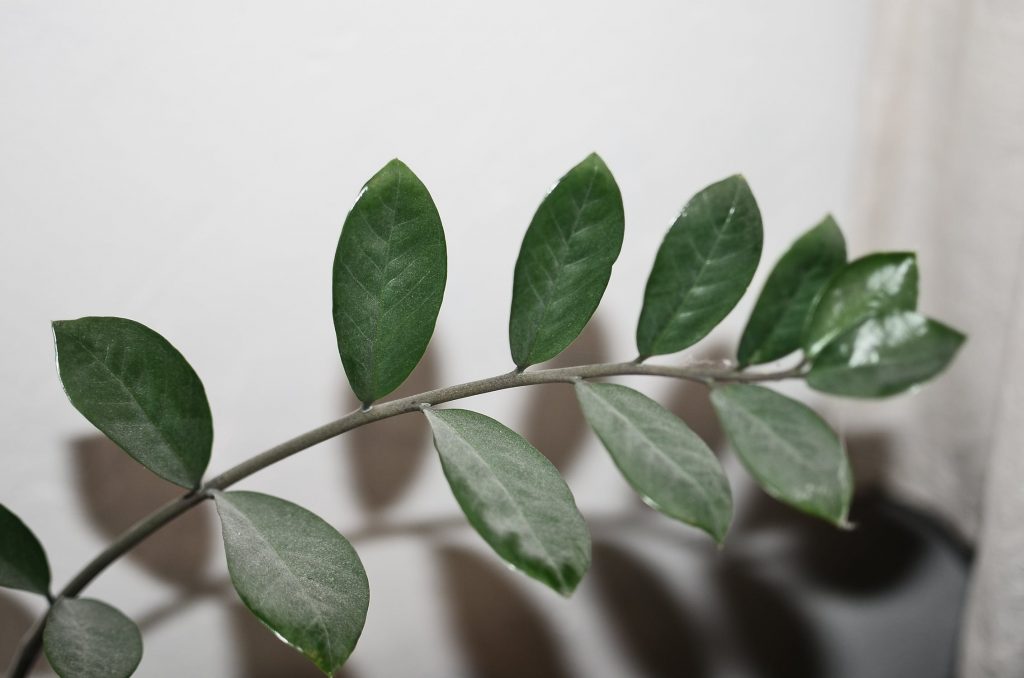
Zamioculcas zamiifolia a beautiful shiny leaves plant rarely occurs in the world. This is easy to maintain and gives glossy look. There are some facts about zamioculcas zamiifolia these are:
1, Zamioculcas Zamiifolia is an easy-growing plant called ZZ plant, Zuzu plant due to their botanical name. This flowering plant is a member of the family Araceae containing the single species Zamioculcas Zamiifolia.
2, Zamioculcas zamiifolia have two varieties based on color variations, one is “Raven” which is a new variety famous due to its purple maroon foliage. The other one is variegated that has green foliage with white or yellow foliage.
3, Zamioculcas zamiifolia is typically a tropical perennial plant, native to eastern Africa, southern Kenya to northern South Africa. It is a herbaceous, evergreen plant with the most attractive foliage and easy to care for but also faces drought due to its potato-like rhizome.
4, Zamioculcas zamiifolia grows slowly and reached the height of 2 to 3 feet with a small stem thickened at the bottom. They do not have a true stem, and they seem to be considered stemless and produce a small stem in 3 to 4 years.
5, Zamioculcas zamiifolia have many leaves that emerge from the stem having 7 to 15 leaflets. The leaves are dark green, shiny, smooth, and most attractive to grow as an indoor plant in homes and offices.
6, Zamioculcas zamiifolia produces flowers at the base during spring or the growing season which are brown-yellow to bronze. The flowers are not seen clearly because it is hidden by the leaf at the bottom.
7, Zamioculcas zamiifolia grows well in bright light or also grows well at low light but avoids direct sunlight that causes the burning of leaves. It is easily cared for as an indoor plant under low light.
8, Zamioculcas zamiifolia need a well-draining, nutrients rich potting soil which is a mixture of perlite, peat moss, and sand. The pot has a draining hole at the bottom, which is good for well-draining.
9, Zamioculcas zamiifolia plants are drought tolerant or grow in a low water supply and allow the topsoil to dry out between watering. So, it is necessary to water them less, not too much because over-watering rots the stem and rhizome.
10, Zamioculcas zamiifolia likes a warm temperature of about 65 to 70°F (15 to 24°C) in which grows well. Avoid placing them in low temperatures below 45°F because they could not tolerate the cold temperatures.
11, Zamioculcas zamiifolia grows at home in humidity, but if your home has a dry condition, increase the humidity by placing a humidifier or mist after 2 to 3 days. You can also increase humidity by placing a tray of water behind the pot.
12, Usually, zamioculcas zamiifolia does not require fertilizer because it is a slow-growing plant. Fertilize them during the growing season (April, August) for optimum growth with a liquid houseplant fertilizer once a month.
13, Pruning is necessary for the ZZ plant to cut the yellow leaves near the bottom and stem the older stem. This helps to give shape to the plant for a beautiful foliage look.
14, Zamioculcas zamiifolia propagates by root division and by leaves potting. Separate the rhizome from the stem and pot them in the new pot with well-draining soil, water them, and give all nutrients for their growth.
15, Zamioculcas zamiifolia is propagated by leaves by cutting the leaves and then put them into the new pot. Water them and wait for the roots to develop and properly manage them.
16, Zamioculcas zamiifolia is highly toxic to cats, dogs, and human beings because it contains crystals of calcium oxalate in their leaves and sap. This will cause skin irritation, swelling of the mouth or lips, vomiting, difficulty in swallowing.
17, Zamioculcas zamiifolia faces no disease and pest problems. It can face rooting rot if the soil is over-watered or does not have drain holes. So, keep them healthy by maintaining well-daring soil and water before topsoil dries out.
References:
- https://plants.ces.ncsu.edu/plants/zamioculcas-zamiifolia/
- https://www.proflowers.com/blog/zz-plant-care
- https://www.gardenista.com/posts/everything-you-need-to-know-about-zz-plants-zamioculcas-zamiifolia/
- https://en.wikipedia.org/wiki/Zamioculcas
